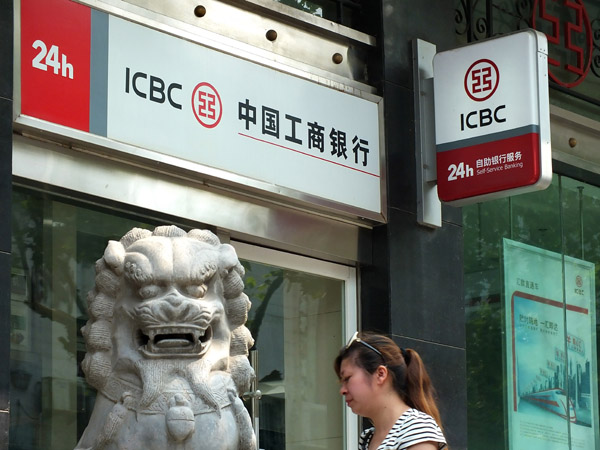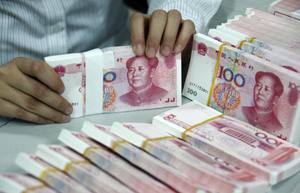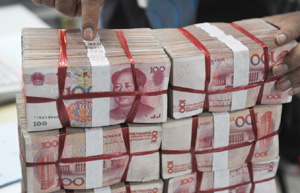 |
|
A branch of Industrial&Commercial Bank of China Ltd in Yichang, Hubei province. [Provided to China Daily] |
China's biggest banks, already poised for the weakest profit growth in more than a decade, risk a further erosion in earnings from record share sales intended to boost their capital after a credit spree.
Industrial & Commercial Bank of China Ltd, the nation's largest lender, and its listed peers this year proposed selling $63 billion of preferred and common stock, exceeding United States and European banks' combined $56 billion, according to data compiled by Bloomberg.
The five biggest Chinese banks report second-quarter earnings starting on Tuesday.
Selling preferred stock will saddle the banks with expensive dividend payments, an extra drag on retained profits. Shares of China's lenders, trading at the cheapest price-to-earnings valuations among global banks, are already constrained by rising bad loans, a faltering economy and prospects of more equity sales.
"It's a vicious cycle," Chen Xingyu, a Shanghai-based analyst at Phillip Securities Research, said. "Unlike the biggest banks in the US and Europe, Chinese banks are still run on a primitive and capital-intensive business model of taking deposits and offering loans: That means they are always in need of capital replenishment."
China's five biggest banks-ICBC, Bank of China Ltd, Agricultural Bank of China Ltd, China Construction Bank Corp and Bank of Communications Co-may report a 7 percent increase in combined net income to 924 billion yuan ($150 billion) this year, according to analysts' estimates compiled by Bloomberg.
That compares with about $70 billion for the top five US banks, led by Wells Fargo & Co, and $47 billion for the five largest in Europe.
Second-quarter profit growth for China's Big Five may range from a high of 12 percent for Agricultural Bank to a low of 5 percent for Bank of Communications, according to the average estimates in a Bloomberg survey.
The five largest banks trade in Hong Kong at an average of about five times their estimated earnings on a per-share basis for 2014, the lowest globally, according to data compiled by Bloomberg on global banks with a market valuation of more than $10 billion. That is less than half the valuation of the benchmark Hang Seng Index. HSBC Holdings Plc trades in London at about 12 times, JPMorgan Chase & Co at about 10 times in New York.
Rising nonperforming loans, which climbed to 1.08 percent of outstanding credit at the end of June, the highest level since the first quarter of 2011, have curbed investors' appetite for the stocks. In May, Guotai Junan Securities Co said lenders' share prices implied a perceived bad-loan ratio as high as 7.8 percent.
The Big Five banks may face a combined capital shortfall of as much as $77 billion by the end of 2018, taking into account the fundraising already announced and assuming the Chinese government pushes banks to exceed minimum capital-adequacy standards, according to Jim Antos, a Hong Kong-based analyst at Mizuho Securities Asia.
Listed Chinese banks have already raised at least 207 billion yuan from so-called Basel-compliant bond sales this year to boost their Tier-2 capital. Bank of Communications sold 28 billion yuan of the securities on Monday.
ICBC and Agricultural Bank each plan to sell 80 billion yuan of preferred stock, while Bank of China says it will raise 100 billion yuan. The companies haven't said when the securities will be sold.
The regulator allowed preferred-share sales this year for the first time because most banks' market valuations were less than their net assets, which prohibits them from selling common shares under Chinese rules.
"Preferred shares are a new way to raise funds, but it's an expensive way and won't change the pessimism many investors have toward China banking stocks," Chen of Phillip Securities said. "The deterioration of earnings and asset quality will continue for at least the next three years."
|
 |
 |
| China banks' bad loans slightly up | Chinese institutions issue nearly 200b in interbank CDs |
